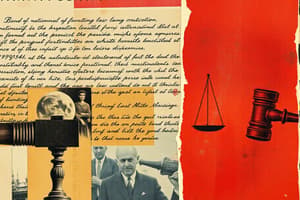Podcast
Questions and Answers
What does the Fourth Amendment protect against?
What does the Fourth Amendment protect against?
- Cruel and unusual punishment
- Self-incrimination
- Double jeopardy
- Unreasonable searches and seizures (correct)
Which case established the exclusionary rule at the federal level?
Which case established the exclusionary rule at the federal level?
- Maryland v. Bowie
- Arizona v. Gantt
- Weeks v. United States (correct)
- Map v. Ohio
Which amendment gives the right to remain silent?
Which amendment gives the right to remain silent?
- Fourteenth Amendment
- Sixth Amendment
- Fifth Amendment (correct)
- Fourth Amendment
What significant principle did Edwards v. Arizona establish?
What significant principle did Edwards v. Arizona establish?
What does Michigan v. Long pertain to?
What does Michigan v. Long pertain to?
Which case discusses the concept of coercion violating due process?
Which case discusses the concept of coercion violating due process?
What is the significance of the case Maryland v. Bowie?
What is the significance of the case Maryland v. Bowie?
What does the term 'good faith exception' refer to?
What does the term 'good faith exception' refer to?
Flashcards
Fourth Amendment: Searches and Seizures
Fourth Amendment: Searches and Seizures
The Fourth Amendment protects against unreasonable searches and seizures, requiring a warrant based on probable cause.
Fifth Amendment: Self-Incrimination
Fifth Amendment: Self-Incrimination
The Fifth Amendment protects against self-incrimination, allowing individuals to remain silent.
Sixth Amendment: Right to Counsel & Confrontation
Sixth Amendment: Right to Counsel & Confrontation
The Sixth Amendment guarantees the right to legal counsel and to confront witnesses.
Fourteenth Amendment: Due Process & Equal Rights
Fourteenth Amendment: Due Process & Equal Rights
Signup and view all the flashcards
Exclusionary Rule
Exclusionary Rule
Signup and view all the flashcards
Fourth Amendment: Protection for Overnight Guests
Fourth Amendment: Protection for Overnight Guests
Signup and view all the flashcards
Search Incident to Arrest
Search Incident to Arrest
Signup and view all the flashcards
Protective Sweeps
Protective Sweeps
Signup and view all the flashcards
Study Notes
Fourth Amendment
- Prevents unreasonable searches and seizures
- Requires a warrant based on probable cause (PC)
Fifth Amendment
- Prevents self-incrimination
- Right to remain silent
Sixth Amendment
- Right to counsel
- Right to confront witnesses (e.g., "I want a lawyer")
Fourteenth Amendment
- Extends Bill of Rights protections to the states
- Guarantees equal rights
Exclusionary Rule Cases
- Weeks v. United States: Exclusionary rule applies to federal courts
- Mapp v. Ohio: Exclusionary rule applies to state courts (evidence illegally obtained is inadmissible)
- Minnesota v. Olson: Fourth Amendment protection extends to overnight guests
Search and Seizure Cases
- Chimel v. California: Search incident to arrest is permissible in the area within the arrestee's immediate control
- Maryland v. Buie: Protective sweeps are allowed if officers have reasonable belief of danger
- United States v. Sokolow: "Terry stop" (detaining a person based on reasonable suspicion) is permissible
- Arizona v. Gant: Search of a vehicle is allowed if the arrest is in the vehicle's area or the officer has reason to believe evidence is inside
Good Faith Exception
- United States v. Leon: Evidence obtained under a warrant that is later deemed invalid is admissible if the officer acted in good faith.
- Arizona v. Evans: The good faith exception applies to court errors, like errors in warrant databases.
Due Process Violations
- Brown v. Mississippi: Coerced confessions are unconstitutional.
Interrogation and Miranda Rights
- Rhode Island v. Innis: Two officers discussing a case amongst themselves is not considered interrogation (for Miranda purposes).
- Edwards v. Arizona: Interrogation must cease when a suspect requests counsel.
Arrestee Rights and Timelines
- McNabb v. United States: Arrestees must be brought before a magistrate promptly (within a reasonable time to avoid 5th Amend. violations)
- Mallory v. United States: (Same as McNabb, often referred to as the McNabb-Mallory rule)
Officer Liability
- Ohio v. Harris: Officers can be held liable for inadequate training leading to misconduct.
Studying That Suits You
Use AI to generate personalized quizzes and flashcards to suit your learning preferences.




